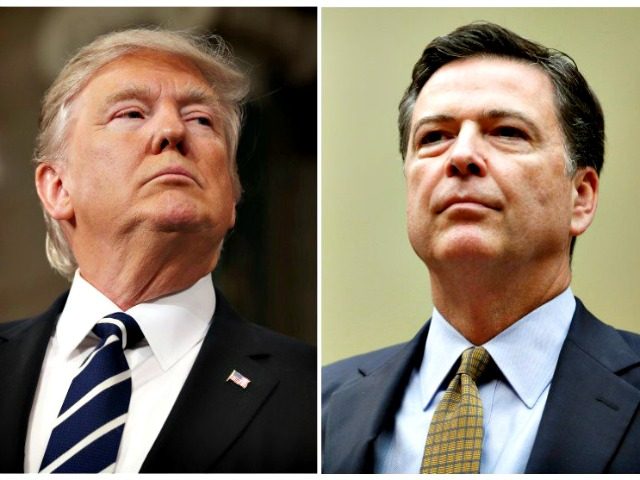President Donald Trump has constitutional authority to prevent former FBI Director James Comey from testifying before Congress by invoking executive privilege but instead has chosen to let his former top investigator speak publicly.
Comey is set to testify before Congress this week, in what will be a major media event. This will be the first time he has spoken publicly since President Trump fired him last month, although leaked reports that the former FBI director will not accuse Trump of obstructing justice suggest that many of the president’s critics may be in for a disappointment.
But fewer people are talking about why it is that Comey is speaking at all, or giving any credit to the president who could stop the testimony if he wanted to do so.
Presidents have executive privilege. It comes in two forms: presidential communications privilege and deliberative process privilege. The latter is not too difficult to overcome. It involves discussions between administration personnel on how to perform their duties or carry out the president’s policies.
But the former—presidential communications privilege—is formidable, implicit in the Constitution’s Article II vesting of all federal executive power in the president alone. The Constitution contemplates that for the president to do his job, he must be able to have frank conversations with those who serve under him.
Many presidential decisions are life-or-death matters, or impact millions of people. Many are extremely sensitive conversations that should not ever become public. They’re the stuff of action movies and dramatic novels.
Executive privilege is necessary because people would be less willing to be perfectly blunt with the president if they thought they might later have to testify about what they said, and many presidents may not ask important questions that need to be asked if he thought it might be disclosed publicly. The presidential communications privilege ensures that when crisis situations happen, everyone huddled with the president—whether in the Oval Office, the Cabinet Room, the Situation Room, at Camp David, or aboard Air Force One—will give their very best advice to help the commander-in-chief make the best possible decision.
Sometimes executive privilege is absolute. Discussions about diplomatic secrets or military matters are categorically protected from public disclosure. No matter how great the public interest may be in such things, the world is a dangerous place, and certain conversations with the commander-in-chief must always be protected for the greater and long-term good of the nation.
For other matters, courts look to various factors, as explained in my academic publication on executive privilege. Various factors influence the strength of an executive privilege claim. For example, the claim is stronger if it involves foreign policy than domestic policy. It is stronger if it involves White House staff than staff in an agency. And it is stronger when it involves senior officers—such as top Senate-confirmed presidential appointees—than lower-level staff.
Klukowski-Making Executive Privilege Work-59 Cleveland St. L. Rev. 31 (2011) by Breitbart News on Scribd
When it comes to Comey, some of these factors support executive privilege, and others do not. But on balance, the elements of direct presidential conversations, national security, foreign intelligence, and involvement of senior White House personnel add up to a very strong claim of executive privilege.
There are other factors, too, that courts are likely to look at, but have never needed to previously consider. (Very few court cases involve executive privilege.) For example, the claim is likely stronger if it involves government force or intrusiveness than regulatory matters.
The FBI is a police agency with the power to break down doors, handcuff people, detain them in a jail-type facility, and even use lethal force. The FBI’s coercive mandate should be a factor that makes it more likely that executive privilege attaches when the president speaks with the director of that incredibly powerful agency.
The person who holds a legal privilege decides whether to invoke it or waive it. For executive privilege, that means the president decides. (The vice president also has executive privilege, but to a lesser extent. Moreover, although there has never been a lawsuit on this, it is virtually certain that if a VP enjoys executive privilege, then so does a president-elect, which would cover all matters pertaining to President Trump’s transition team.)
Consequently, only President Trump can decide whether to invoke the presidential communications privilege to cover his conversations with Comey. The former FBI official has no say in the matter; if the president asserts it, Comey is legally required to stay silent.
President Trump has decided not to invoke that privilege over Comey, although it is his legal right to do so under the Constitution. This is good politics, by ensuring transparency in a situation where secrecy might breed suspicion.
Nobody likes to be fired. Comey is surely going to say things about the president that will not be very nice. But President Trump has made the right political call here. The negative visuals of allowing an unhappy former employee to trash him on camera are outweighed by the positive politics of showing the country that there is no smoking gun against the president.
Permitting Comey to testify dispels the myth—breathlessly repeated by the establishment media—that the ousted FBI director has something explosive implicating the president, and that President Trump is trying to silence him.
Allowing Comey to speak also ensures that Comey will drive a stake through the single most incriminating-sounding accusation. He is likely to admit that he does believe the president’s words to him in their conversation about General Mike Flynn do not constitute obstruction of justice. Ending that canard is doubtless a priority in terms of public confidence.
President Trump put good policy and good politics above his legal rights in this situation. His critics better be careful, or they might find themselves accidentally admitting that his actions here are—presidential.
Ken Klukowski is senior legal editor for Breitbart News. Follow him on Twitter @kenklukowski.

COMMENTS
Please let us know if you're having issues with commenting.